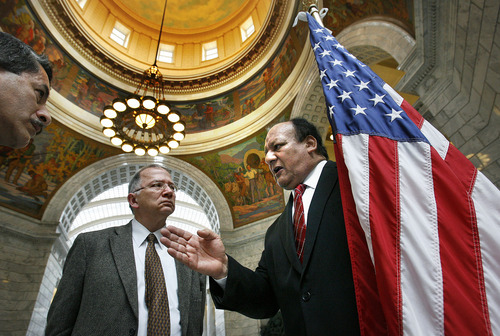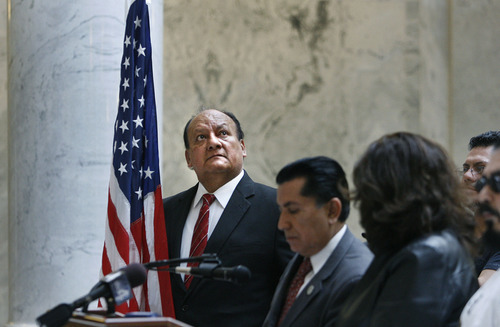This is an archived article that was published on sltrib.com in 2011, and information in the article may be outdated. It is provided only for personal research purposes and may not be reprinted.
A proposed boycott by Latinos in Utah is running into some opposition within that community a day after it was announced in the Capitol over worries the approach was rushed and lacks focus.
The boycott is scheduled to begin Monday just after midnight, and its chief organizer, Jose "Pepe" Gutierrez, will have people distributing fliers Saturday to get the word out. He said the word is already out in the community. Gutierrez expects "many thousands" to participate in the two-week boycott.
Gutierrez said the boycott is a result of wanting to flex economic muscle, show the public that there is a human element to the immigration issue and oppose the trio of related bills awaiting signatures from Gov. Gary Herbert.
"We are united under one voice," Gutierrez said. "We are very upset."
But there is a question about that.
Michael Clara, state chairman of the Utah Republican Hispanic Assembly, said he felt the legislative session and the resulting proposals that emerged from it worked out for the community.
He said among those he has spoken with in the Latino community, there isn't much support for a boycott.
"I'm not understanding what the purpose of the boycott is," Clara said. "I guess it would be to express some anger. But I think we should be celebrating the success."
The Legislature approved what has been viewed as a unique approach to illegal immigration, and it has garnered attention nationally by passing a comprehensive guest-worker bill, an enforcement bill and a migrant-worker bill.
The call for a boycott among Latinos at all businesses — Gutierrez wanted to be clear that no specific business is being targeted — could have a dramatic impact if it gained widespread participation. It also calls for Latinos to pull money out of banks and register to vote.
According to most recent U.S. census data, the Latino population of Utah is 306,501, which is 11.6 percent of the population. According to the Pew Hispanic Center, there are 110,000 undocumented immigrants in the state. Information is not available showing how much or little overlap there is on those numbers.
Pam Perlich, professor of economics at the University of Utah, said full participation would be crippling to this economy but also said it would have to have broad support and wouldn't work on its own.
"One event isn't going to shift the tide," she said. "It's going to have to be a sustained effort over a long period of time."
Even Archie Archuleta, a longtime activist and member of the community group Centro Civico, said he wasn't sure how the boycott would work and agreed it was "an experiment" to see if it would have the desired effect of capturing the attention of lawmakers and businesses.
He also said he wasn't sure how many would participate — though he said at a community meeting last week with "75-100 people" the vote was almost unanimous to go forward with a boycott and that the idea came from the group.
Gutierrez said he had little doubt it would be a success, but Tony Yapias, director of Proyecto Latino de Utah, said it was misguided.
"The business community and the Chamber of Commerce stepped up to the plate this year," Yapias said. "They signed the Utah Compact and the Salt Lake Chamber did an excellent job of stepping up and to now call for a boycott is like slapping them in the face after all they did to help us. Those pushing the boycott aren't seeing the big picture."





